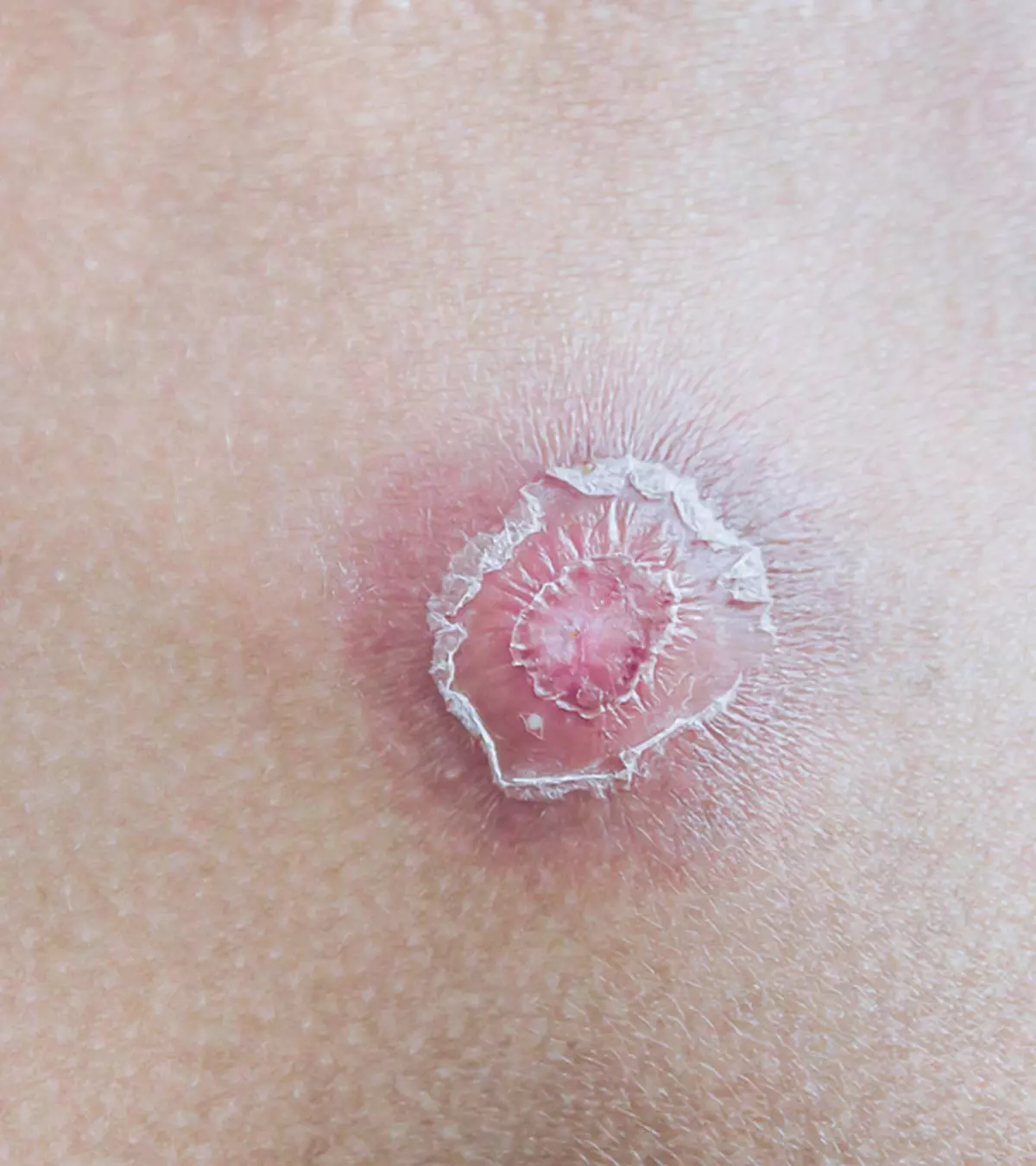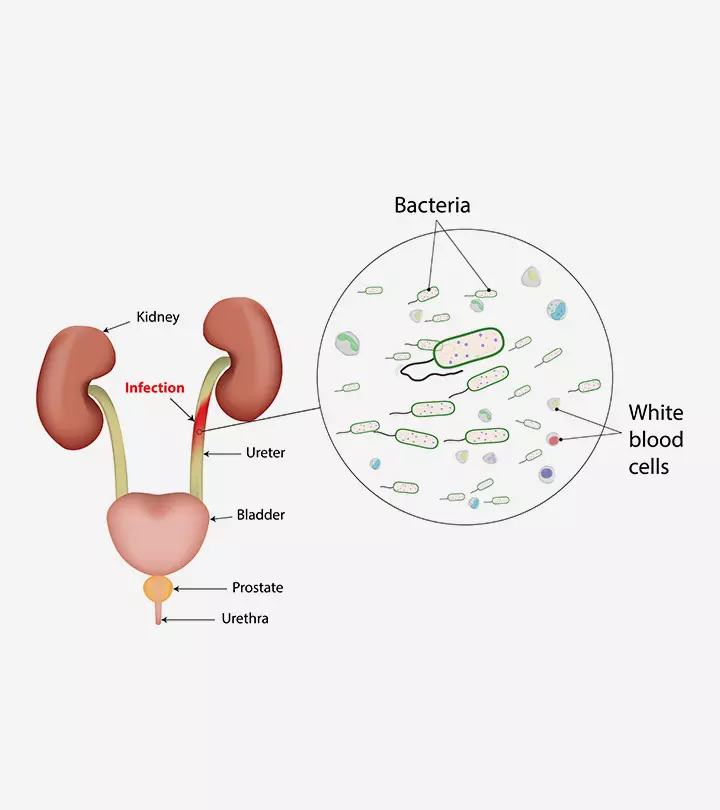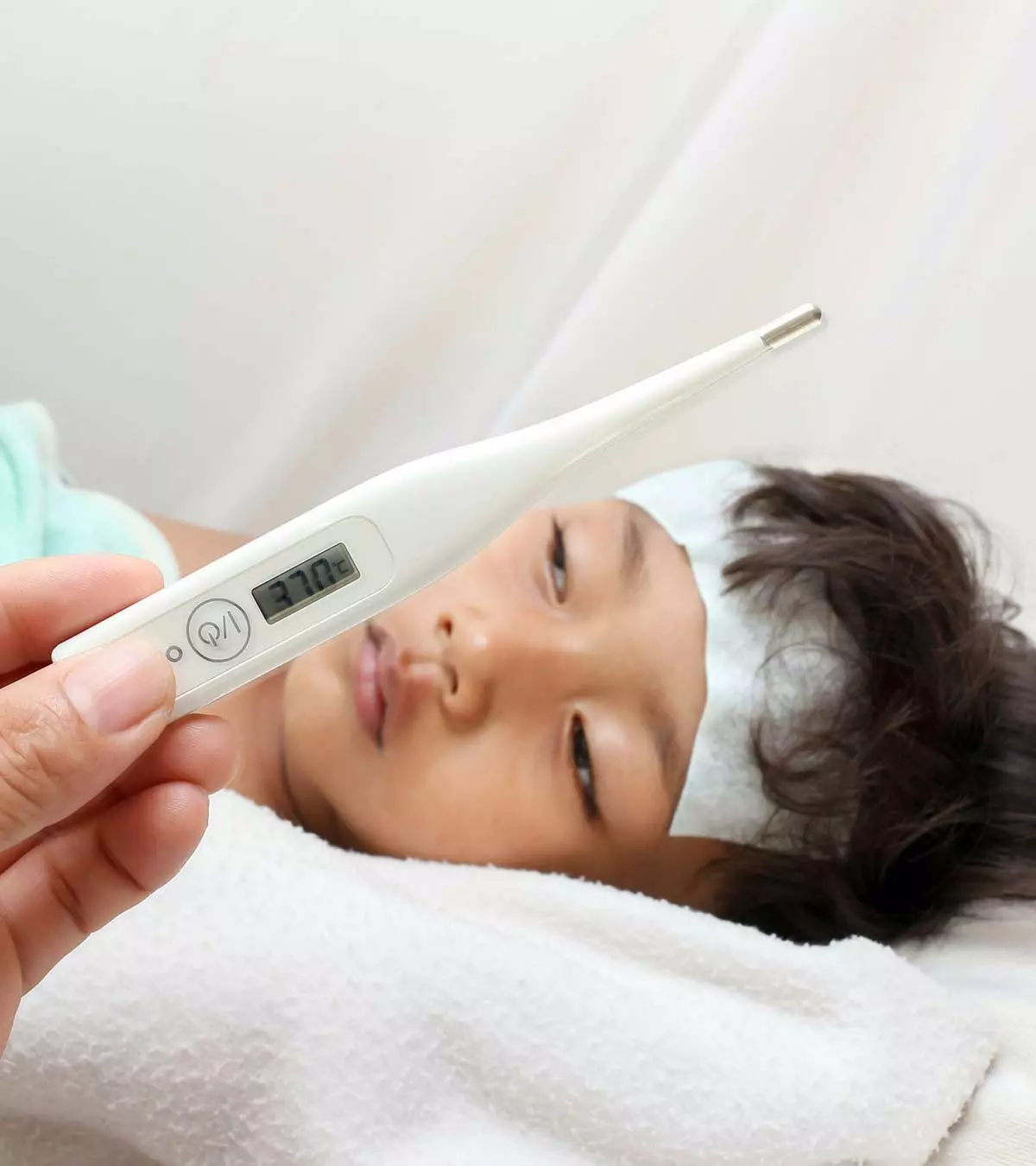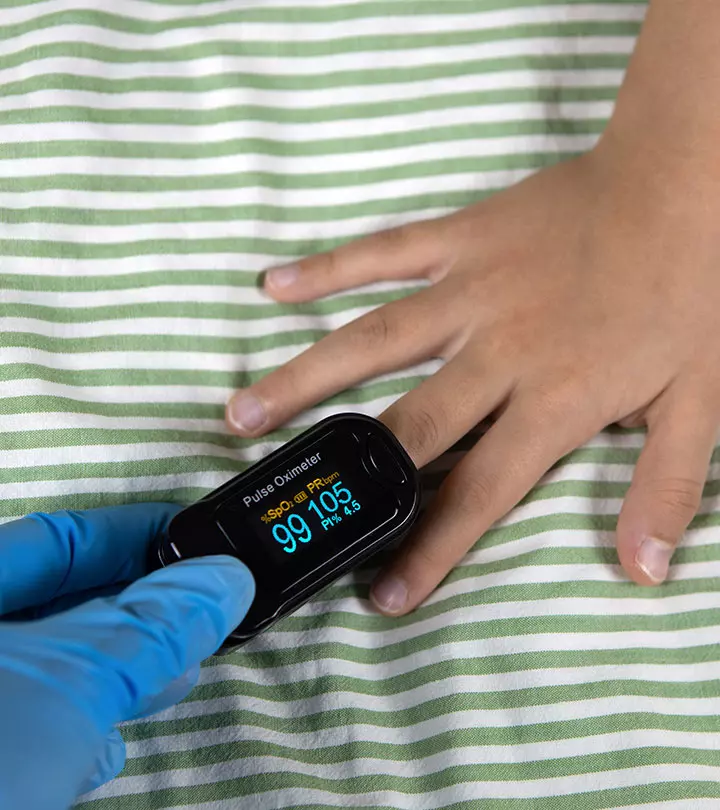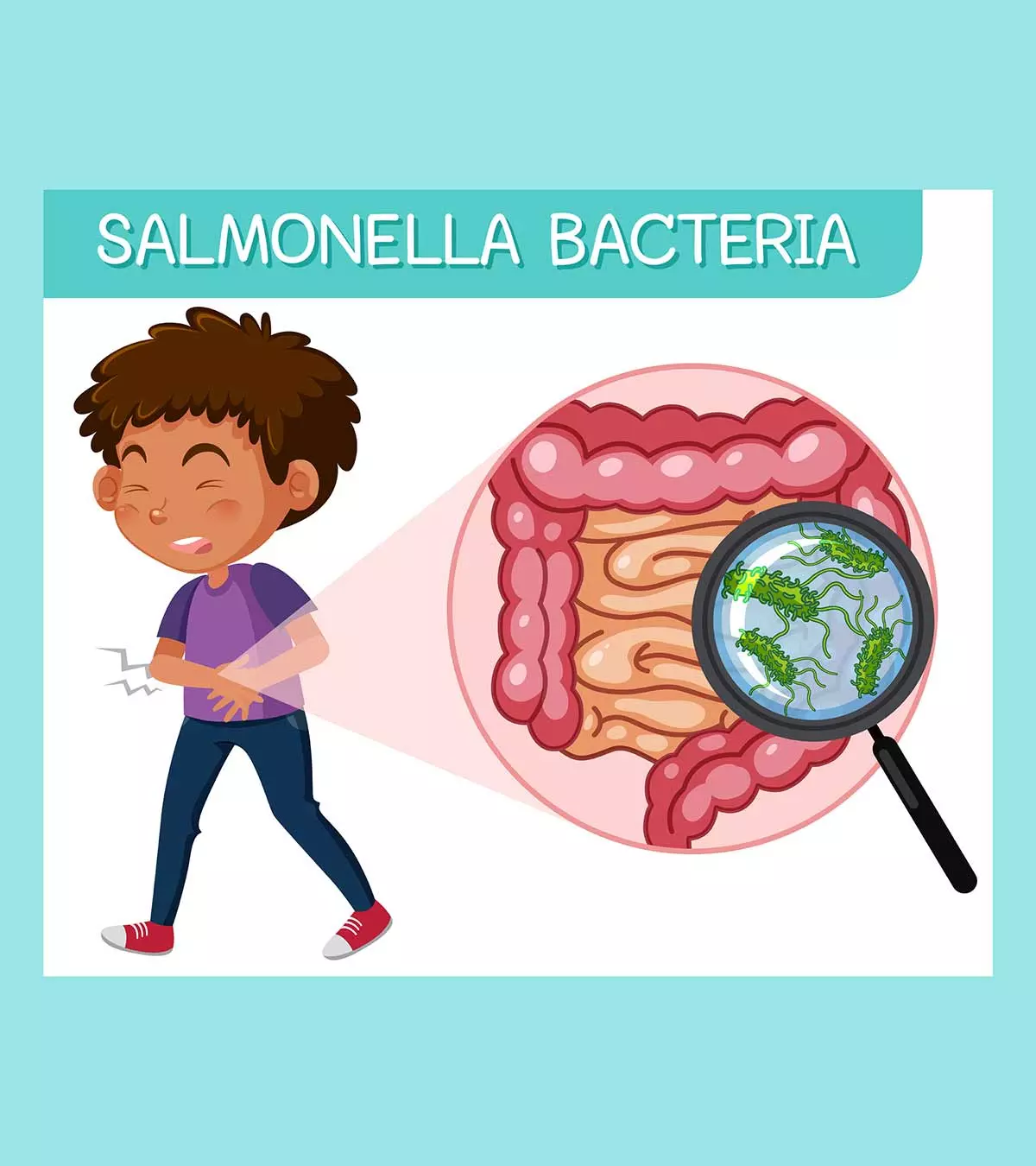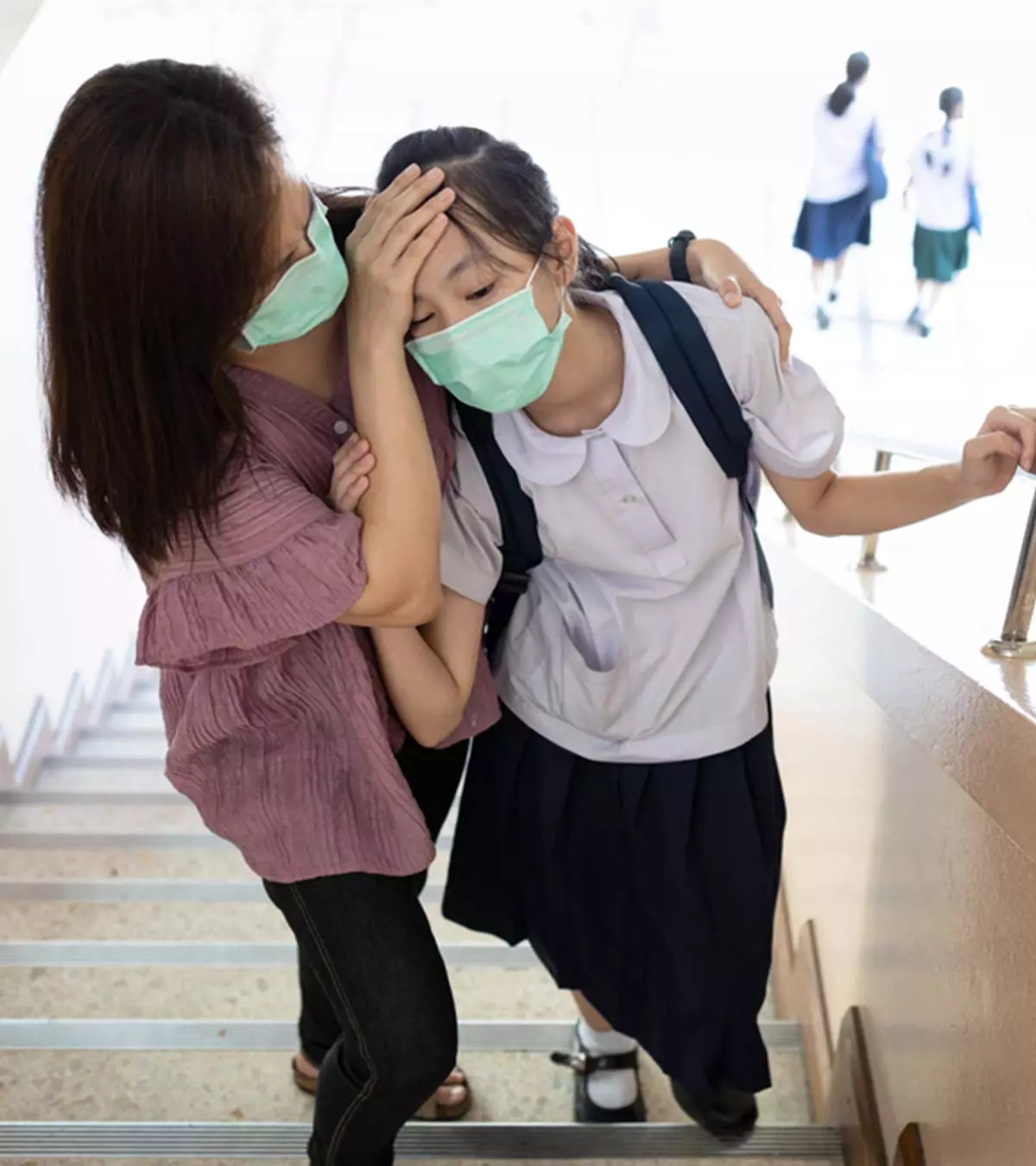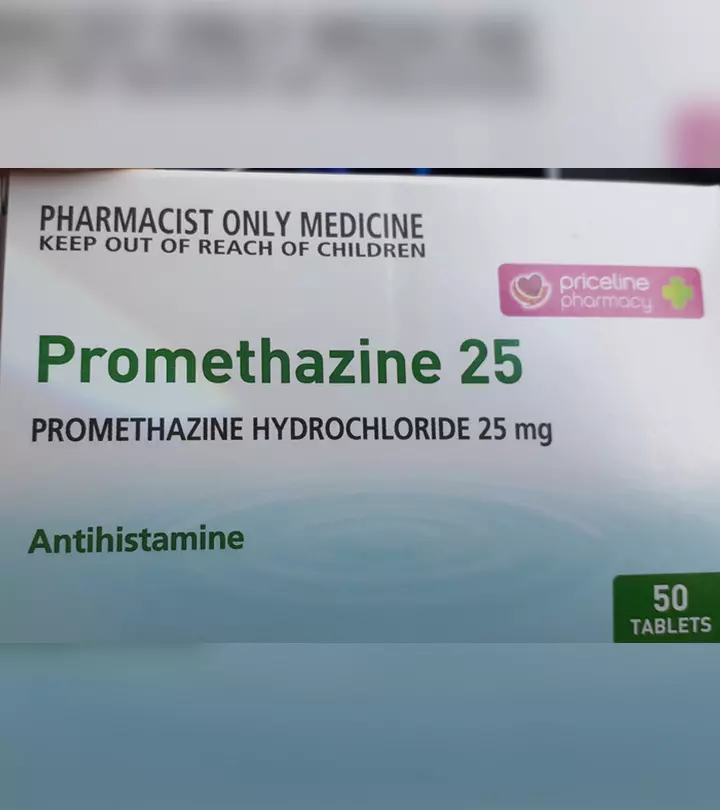
Image: Shutterstock
Promethazine is an antihistamine drug that provides symptomatic relief from the common cold and flu, allergies, short-term sleep issues, vomiting, and nausea due to vertigo/motion sickness.

While generally safe, Promethazine for kids must be administered with caution as it is a sedative drug and is likely to induce sleepiness and is used as a sleep aid (1). Some brand names under which Promethazine is available over the counter (OTC) are Phenergan, Avomin, and Sominex.
Keep reading to know more about the safety, uses, and side effects of Promethazine for kids.
Key Pointers
- Promethazine is an antihistamine drug to manage allergies, motion sickness, nausea, vomiting, sedation, etc.
- The FDA recommends against using promethazine for children under two years and suggests cautious use for children above two years.
- Drowsiness, dry mouth, nightmares, blurred vision, etc., are a few side effects of promethazine in children.
What Is Promethazine?
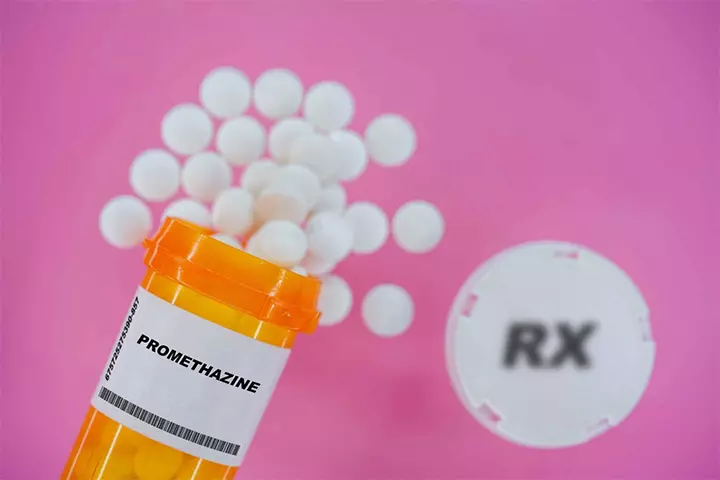
Promethazine, a first-generation antihistamine, belongs to the phenothiazine class of drugs. It acts by reducing the actions of natural substances in the body, such as histamine, dopamineiA chemical that transport messages among nerve cells and also acts as a hormone that induces happiness and motivation. , and acetylcholineiA signaling molecule that plays a significant role in several physiological functions of the body. . The US Food and Drug Administration (FDA)-approved uses of Promethazine include (2) (3):
- Allergies. In the US, about 18.9% of children suffer from seasonal allergies, according to the Centers for Disease Control and Prevention (CDC). Seasonal allergies (allergic rhinitis) causing runny nose and watery eyes, allergic conjunctivitis along with skin conditions causing itching and swelling can be treated with Promethazine. In addition, it can also be used in combination with other drugs to treat severe life-threatening allergic reactions (anaphylaxis).
- Vomiting and nausea in children caused due to anesthesia, chemotherapyiA treatment modality that uses chemicals to inhibit or prevent the growth of cancerous cells in the body. , or post-surgery effects.
- Motion sickness. Most effective when given 30 minutes to one hour before travel or other trigger factors.
- Sedation. Used along with painkillers to calm patients before or after surgery.
Is Promethazine Safe For Children?

The FDA contraindicates the use of Promethazine tablets or suppositories in pediatric patients below two years of age. It should be used with caution in children aged two years and above due to the risk of breathing problems (respiratory depression). Promethazine is not recommended for uncomplicated vomiting in children but only when vomiting is prolonged and due to a diagnosed condition. Children below 16 years of age should not use some products that contain Promethazine in combination with other drugs. You should consult a pediatrician before giving Promethazine to your child (2) (4).
What Is The Dosage Of Promethazine For Children?

Promethazine is available as tablets, syrups, suppositories, and injectable solutions. Seek a pediatrician’s prescription before giving this drug to children. The following table may help you understand the Promethazine dosage, with reference to Phenergan brand oral tablets, syrups, and rectal suppositories containing Promethazine HCl for pediatric patients (4).
| Indication | Dose |
|---|---|
| Allergy | 6.25mg to 12.5mg thrice a day, adjusted to the lowest dose required to relieve symptoms |
| Nausea and vomiting | 0.5mg per pound body weight adjusted to patient’s age and severity of the condition |
| Motion sickness | 12.5mg to 25mg twice daily |
| Sedation | 12.5mg to 25mg at bedtime |
| Pre-and post-operative use as a calming agent | 12.5mg to 25mg |
Note:
Promethazine HCl syrup contains 5-6.25mg drug per 5ml of liquid. Dosage to be calculated accordingly (5). Promethazine suppositories and tablets are available in 12.5mg dosages. Before using Promethazine or Phenergan for kids, consult a doctor to know the appropriate dosage and form based on your child’s condition.
 Caution
CautionWhat Are The Side Effects Of Promethazine In Children?

Promethazine may have the following common side effects (2).
- Drowsiness
- Dry mouth
- Sleep disturbances
- Nightmares
- Nervousness
- Excitability
- Ringing in ears
- Stuffy nose
- Blurred vision
Seek medical advice if these become severe or are not resolved in a few days. Serious adverse effects that need immediate medical help include:
- Wheezing or difficulty breathing
- Slowed breathing or breathing stops for a short time
- Fever
- Sweating
- Irregular or increased heart rate
- Low blood pressure
- Muscle stiffness
- Fainting
- Uncoordinated movements or unusual face and tongue movement
- Hallucinations
- Confusion
- SeizuresiSudden and abnormal surge of electrical activity in the brain characterized by jerking body movements and loss of consciousness.
- Involuntary shaking of body parts
- Unusual bruising or bleeding
- Yellow skin or eyes
- An allergic reaction (rash, hives, swelling of the face, eyes, lips, tongue, throat, arms, hands, feet, ankles, or lower legs, dermatitis, or eczema)
Neuroleptic malignant syndrome (NMS) is a rare yet potentially fatal side effect of Promethazine. Contact a doctor immediately if you see symptoms such as fever, muscle cramps, severe headache, confusion, increased or abnormal heartbeat, or excess sweating.
 Point to consider
Point to considerWhat Are The Precautions To Be Taken When Using Promethazine?

Promethazine has several side effects that mandate precautions for safe usage of Promethazine in children (6).
- Inform the doctor if your child has respiratory problems, such as asthma, chronic obstructive pulmonary disease (COPD) or sleep apnea, liver disorders or Reye’s syndrome, or allergy to sulfites. Promethazine might be contraindicated for children with these conditions.
- Promethazine increases the likelihood of seizures. Talk to the doctor if your child is prone to or has had seizures in the past.
- Discuss with your child’s doctor if your child is on any other medicines, health supplements, or herbal products. Phenothiazine may have drug interactions. Conversely, inform the healthcare provider about your child’s Promethazine usage when seeking medication for any other condition.
- Refrain from involving your child in activities requiring alertness, such as riding a bike or skateboarding, since Promethazine may cause drowsiness and diminished alertness as a side effect.
- Monitor blood sugar in children with diabetes.
- Make sure to use only the prescribed dose for the duration instructed. Do not suddenly stop or increase the dose without consulting a doctor.
- Use the measuring tool provided with the package for syrups to ensure the correct dosage.
- Check the list of ingredients of all other medicines/products administered to the child to avoid an accidental overdose of Promethazine.
- Make sure to check the ingredient list to spot any inactive ingredients that may cause allergies in your child.
- Promethazine may make your child’s skin more sensitive to sunlight. Use sunscreens or protective clothing whenever your child needs to go out in the sun.
- Keep the medication out of children’s reach in child-proof containers. Accidental overdose can be fatal.
 Caution
CautionFrequently Asked Questions
1. Does Promethazine have codeine in it?
Yes, Promethazine can be present in combination with codeine phosphate to relieve cough temporarily and also for upper respiratory symptoms linked with allergy or common cold (9).
2. Does Promethazine help with anxiety?
Promethazine is not used to treat anxiety before and after surgery. However, the use and dose for your child should be determined by the doctor (10).
3. How should promethazine be stored?
Promethazine in tablet and liquid forms should be stored at room temperature, away from heat and moisture, and the suppositories should be stored in the refrigerator. Thus, all forms of promethazine should be kept away from sunlight (2). Promethazine can interact with several medications, increasing the risk of side effects.
4. Do promethazine interact with any other drugs?
Tell your doctor if you’re taking opioid painkillers (like codeine or morphine), MAO inhibitors (like phenelzine), or other drugs that cause drowsiness, dry mouth, or urination problems, as promethazine can make these worse (1). Always check labels and consult your healthcare provider to help prevent potential interactions.
Promethazine is an effective antihistamine for kids. However, despite its effectiveness in treating allergies, nausea, and vomiting in children and adults, Promethazine is only available as a prescription drug due to its ability to induce sleepiness. Instead, second-generation antihistaminesiA class of medications used to treat allergies by blocking the action of histamines (allergens). , such as Loratadine (Claritin), Cetirizine (Zyrtec), and Fexofenadine (Allegra), are recommended over Promethazine for children with allergies due to fewer adverse effects (7), while Ondansetron (Zofran) is used as an antiemetic alternative in children aged four and up (8). So, consult a pediatrician to determine when Promethazine can be prescribed for children.
Infographic: More About Promethazine Suppositories For Children
Promethazine is also available as suppositories which are meant to be used rectally. However, knowing the correct method of using rectal suppositories is important for your child to derive the full benefit from the medication. The infographic below will walk you through the correct method of usage.
Some thing wrong with infographic shortcode. please verify shortcode syntax
Illustration: Promethazine For Children: Dosage And Side Effects
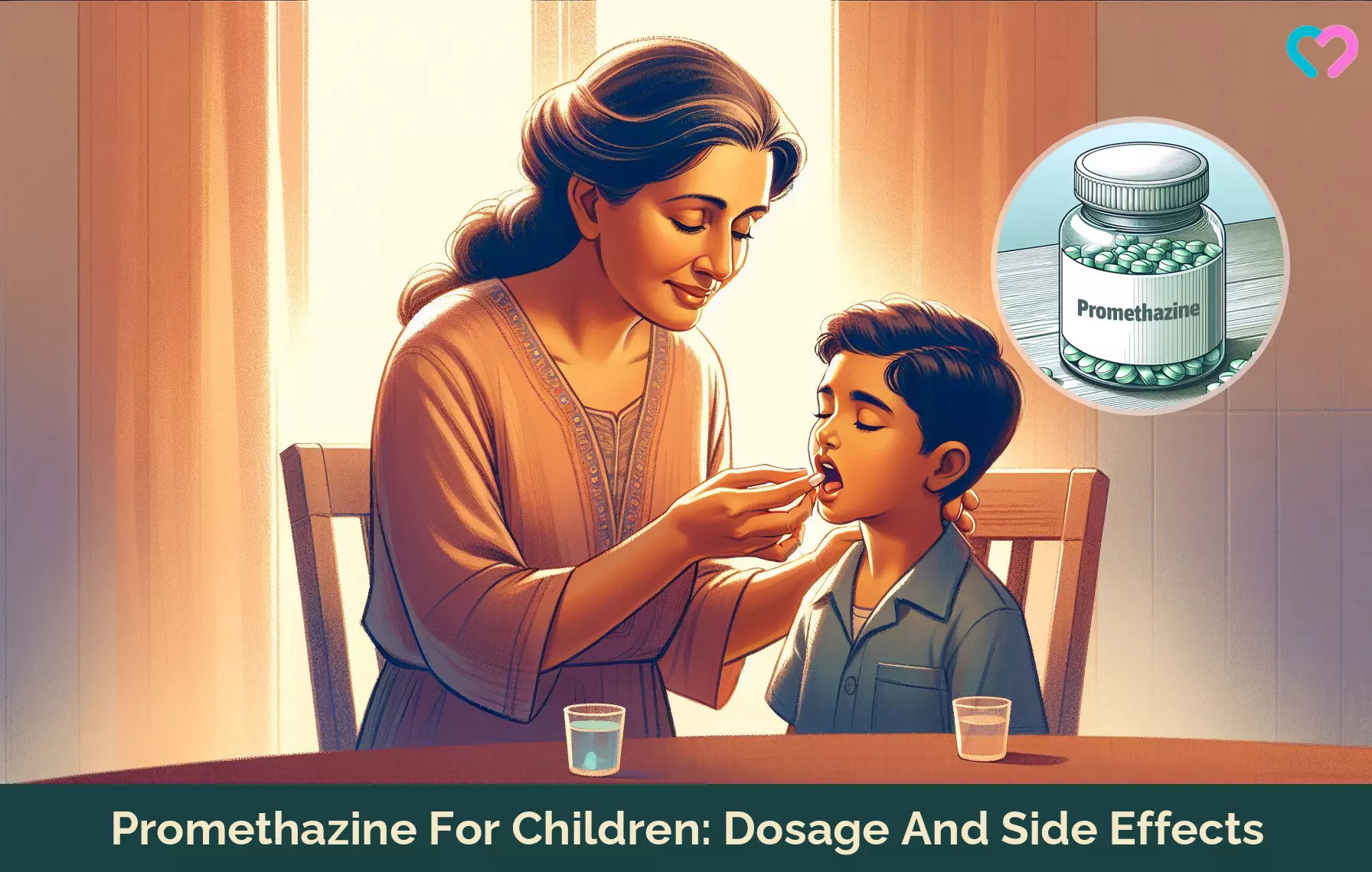
Image: Dalle E/MomJunction Design Team
References
- Promethazine (Phenergan).
https://www.nhs.uk/medicines/promethazine/ - Promethazine.
https://medlineplus.gov/druginfo/meds/a682284.html - Brittin T. Southard and Yasir Al Khalili; (2025); Promethazine.
https://www.ncbi.nlm.nih.gov/books/NBK544361/ - Phenergan (promethazine HCI).
https://www.accessdata.fda.gov/drugsatfda_docs/label/2004/07935s030lbl.pdf - Promethazine hydrochloride syrup.
https://dailymed.nlm.nih.gov/dailymed/fda/fdaDrugXsl.cfm?setid=85f183af-6781-4ceb-9c21-c4ee9a06c355&type=display - Promethazine Pediatric Medication.
https://www.mskcc.org/cancer-care/patient-education/medications/pediatric/promethazine - Roisin Fitzsimon et al.; (2015); Antihistamine use in children.
https://ep.bmj.com/content/100/3/122 - Zofran.
https://www.accessdata.fda.gov/drugsatfda_docs/label/2016/020103s035_020605s019_020781s019lbl.pdf - Promethazine HCl and Codeine Phosphate Oral Solution;
https://www.accessdata.fda.gov/drugsatfda_docs/label/2017/008306s033lbl.pdf - Promethazine (Oral Route);
https://www.mayoclinic.org/drugs-supplements/promethazine-oral-route/proper-use/drg-20070609?p=1 - Promethazine.
https://www.mskcc.org/cancer-care/patient-education/medications/adult/promethazine
Community Experiences
Join the conversation and become a part of our nurturing community! Share your stories, experiences, and insights to connect with fellow parents.
Read full bio of Dr. Salla Semmane
Read full bio of Dr. Joyani Das
Read full bio of Dr. Ritika Shah
Read full bio of Vidya Tadapatri






